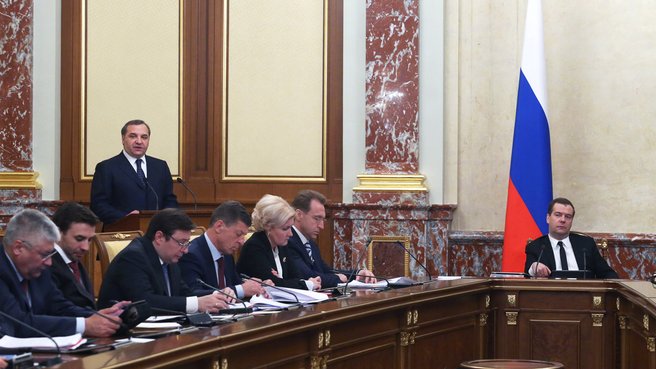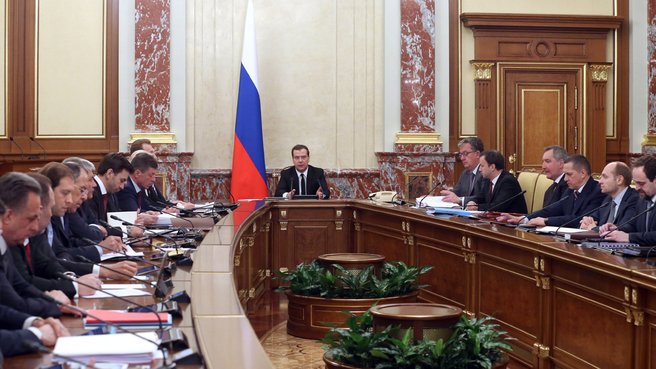The agenda focuses on efforts to improve the early-warning and disaster relief system, to promote fire safety and measures to ensure more rapid response to large-scale emergencies.
Dmitry Medvedev’s introductory remarks:
Good afternoon, ladies and gentlemen.
Before we start discussing the agenda items, I’d like to recall what is probably the most pleasant event of this year, the XXII Olympic Winter Games in Sochi which, to quote international analysts, were one of the best in the history of the Winter Games. Of course, we are very happy to hear this. I would like to thank all the Government members, including Deputy Prime Minister Dmitry Kozak and Minister of Sport Vitaly Mutko, who were responsible for this project, for the extremely competent organisation of this major celebration. I would also like to thank the other ministries and departments that addressed this issue. Naturally, I’d like to thank the Sochi 2014 Organising Committee, the Krasnodar Territory and its administration. On the whole, I would like to thank all the departments responsible for organising the Olympics and for ensuring security.
Of course, it is the triumphant athletes, rather than us, who are the main heroes of the Olympics. But, in any case, intensive efforts to prepare the sport facilities, the infrastructure and to maintain security were required, and it is good that everything has worked out so well.
And now, we need to hold the XI Paralympic Winter Games, due to open 7 March, with the same competence, and use the total experience to prepare for all international sports events in Russia over the next few years.
Dmitry Medvedev: "The XXII Olympic Winter Games in Sochi which, to quote international analysts, were one of the best in the history of the Winter Games."
And, finally, I expect the working group to submit proposals on using the Olympic facilities in Sochi, as well as proposals regarding the entire post-Olympic legacy. We’ll hold a meeting after the end of certain events.
Before we start discussing other issues, I’d like to draw your attention to the fact that I have signed a resolution on social electricity consumption standards. This document allows the regions to decide independently when the mechanism for recording electricity consumption volumes should be activated. They can do this in accordance with different deadlines. Actually, this is what the regions have requested. At the same time, all this should start no later than 1 July 2016. Actually, we’ve put off specific deadlines by two years.
The resolution stipulates the procedure for differentiating prices and rates in line with and in excess of the social standards. The Federal Tariff Service should closely monitor the introduction of regional electricity prices, and it should stipulate penalties for any violation of homeowners’ rights.
Electricity consumption standards will increase for families with many children, for disabled persons, for families raising children with impaired health, for rural residents, for single retired persons and for the residents of rundown and dilapidated housing. We’ve discussed all this with the regions and departments, while addressing these issues.
Dmitry Medvedev: "Electricity consumption standards will increase for families with many children, for disabled persons, for families raising children with impaired health, for rural residents, for single retired persons and for the residents of rundown and dilapidated housing."
At the same time, it should be noted that people will not have to prove their right to obtain these privileges, and they will not have to submit certificates at various offices.
Local government and utility officials will have to exchange information in order to stipulate social standard volumes for every household.
And, finally, we proceed from the fact that the introduction of a new mechanism for recording electricity consumption volumes will enable most Russian citizens to pay less for electricity than they do today. And, of course I also expect that this will eventually reduce the volume of cross subsidies in the power industry, and that this will also make it possible to save more energy. The latter is important for us.
Now let’s move to the agenda. The first item deals with public security and health. This is about preventive activities, mitigating emergencies, and promoting fire safety. These tasks are within the competence of the Ministry of Civil Defence, Emergencies and Disaster Relief. We have shown good results in this area; there are some positive dynamics, though I must admit that last year was quite difficult for the ministry. The flood in the Far East, fires in Siberia, and rising river levels were a serious challenge not only for the regions, but also for emergency ministries, and in general, we managed to solve these problems. But we should develop a system of early forecasting and monitoring of large-scale emergencies and improve the information and alert system.
Dmitry Medvedev: "The introduction of a new mechanism for recording electricity consumption volumes will enable most Russian citizens to pay less for electricity than they do today. And, of course I also expect that this will eventually reduce the volume of cross subsidies in the power industry, and that this will also make it possible to save more energy. The latter is important for us."
Our goals should also include increasing the number of response rescue and fire units. We should provide them with modern equipment. We are also planning to establish air rescue units and of course continue developing the volunteer movement. The Minister of Defence will report on these issues in more detail.
We are also considering a number of other issues, including amendments to the law on citizenship, to simplify the procedure of acquiring citizenship for some people. According to the state immigration policy, we have to take measures to prevent illegal immigration, and now this work is being carried out more aggressively and should be followed to its logical end. At the same time, we should create a system of benefits for law-abiding, skilled and sought-after specialists.
Such specialists will enjoy a simplified procedure for obtaining Russian citizenship including those who graduated from Russian universities and have worked here at least three years. This scenario speaks for itself that these people have committed to live in Russia and they are in demand on the labour market, as they are professionals.
Dmitry Medvedev: "As for foreign nationals, who are engaged in business in Russia and are investors or qualified specialists, for them gaining Russian citizenship should depend on the annual revenue they earn in Russia, or on their investment in authorised capital, as well as on the taxes they pay."
As for foreign nationals, who are engaged in business in Russia and are investors or qualified specialists, for them gaining Russian citizenship should depend on the annual revenue they earn in Russia, or on their investment in authorised capital, as well as on the taxes they pay. I hope this will create a fairer and more motivating system of granting citizenship in our country.
<...>












